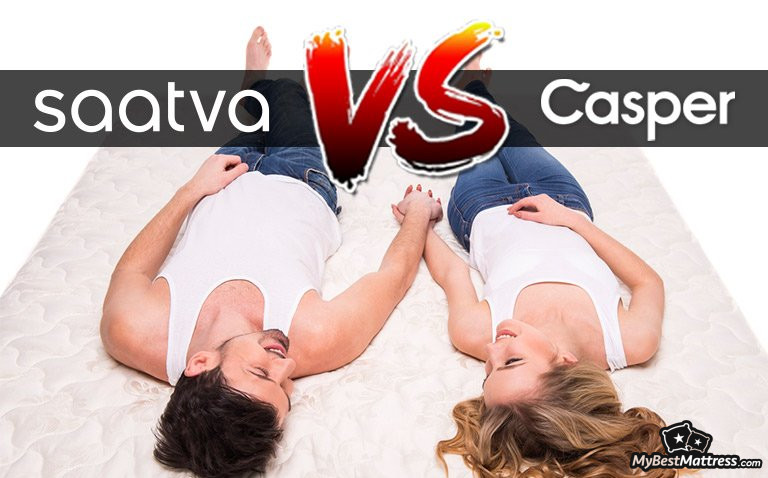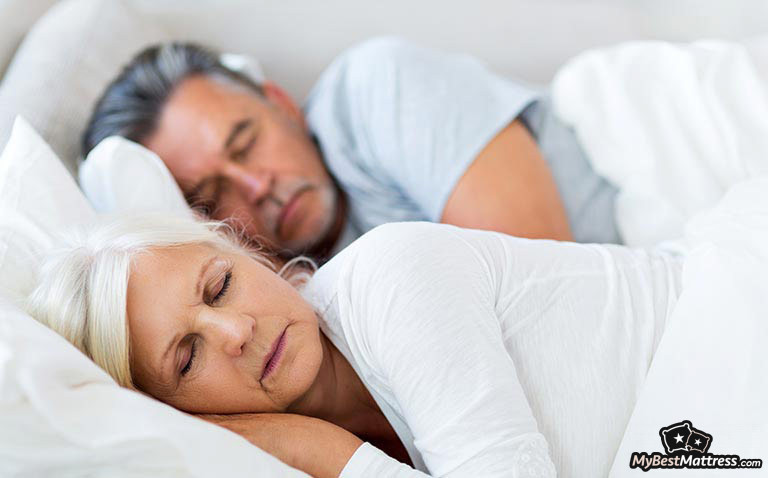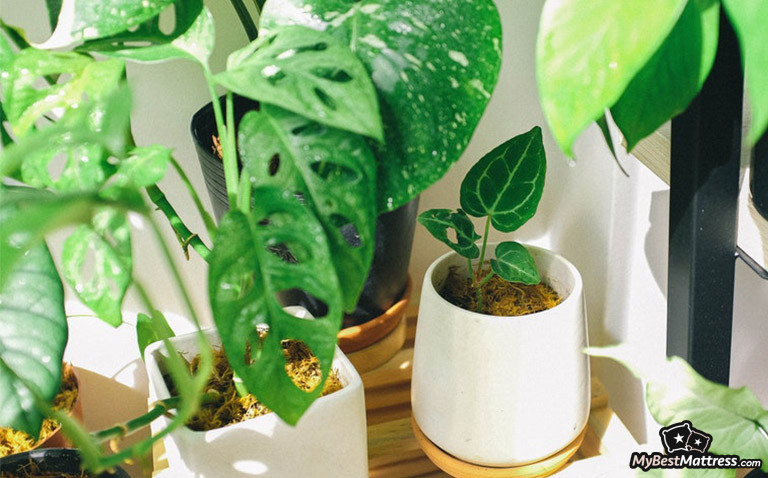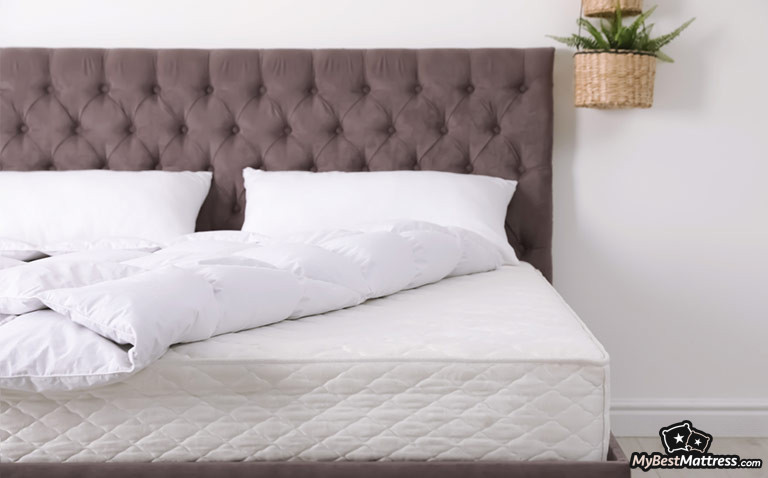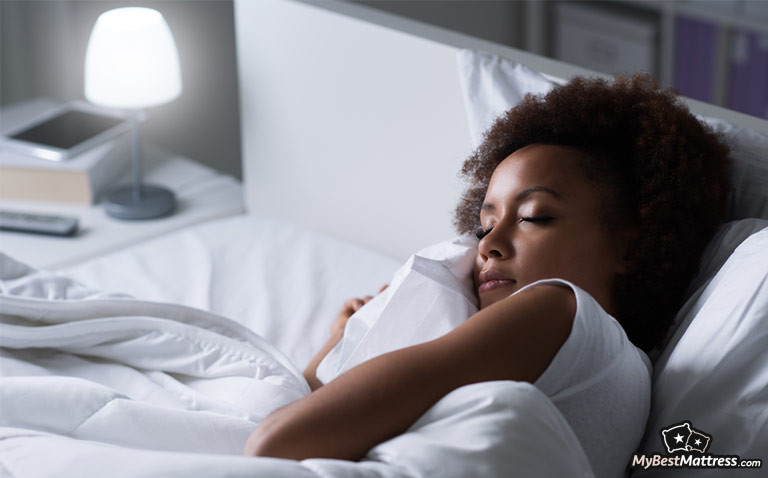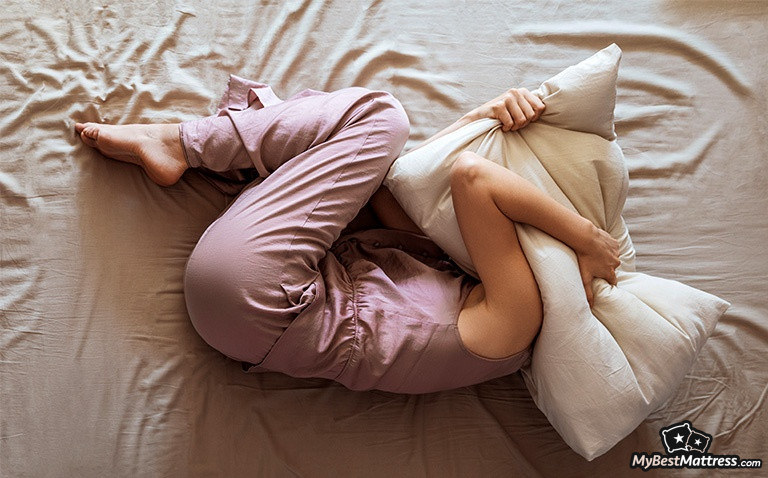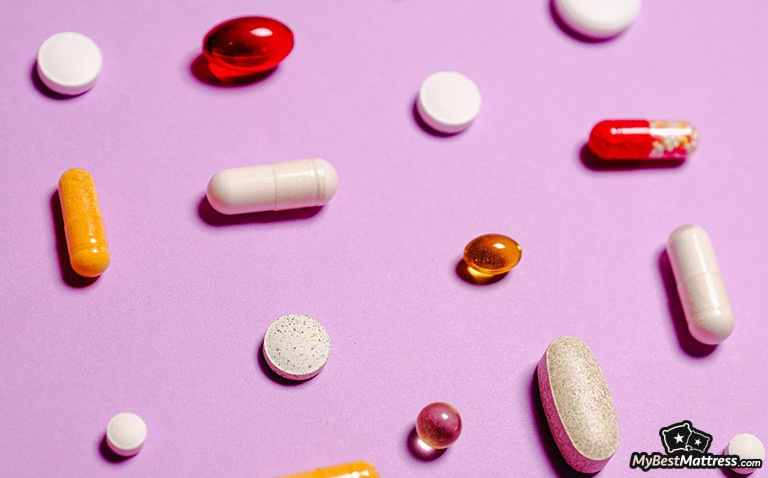
If you regularly have trouble sleeping, you have probably tried various methods how to eliminate that problem. You have attempted several natural ways to help you sleep, but they didn’t seem to work? In that case, you’re probably looking for the best over-the-counter sleep aid instead.
Many medications usually take time to have an effect, so I do recommend starting off with some more effective and much quicker ways to improve your sleep quality. I've noticed that I sleep like a baby when my bed is comfortable. You know, to the point where you never want to leave it.
But of course, sometimes even the best mattress is not enough. Sometimes, natural measures don't help no matter how much you try. In such cases, you may start looking into something more certain — for example, over-the-counter (OTC) sleeping pills.
With the over-the-counter market, it can get quite complicated to explore all the options for the best OTC sleep aid there is. But that’s what I’m here to help you with.
Table of Contents
- 1. Prescription vs. Over-the-Counter Medications
- 2. Food and Drug Administration
- 3. Best Over-the-Counter Sleep Aid
- 3.1. Diphenhydramine aka Benadryl
- 3.2. Doxylamine
- 3.3. Melatonin
- 3.4. Unisom
- 3.5. Magnesium
- 3.6. Valerian
- 4. Important Considerations
- 5. Alternatives for OTC Sleep Drugs
- 5.1. Sleep Schedule
- 5.2. Bedtime Manners
- 5.3. Bedroom Setup
- 5.4. Best Natural Substitutes for OTC Drugs
- 5.5. Herbal Teas for Sleep
- 5.6. Aromatherapy
- 6. Conclusions
Prescription vs. Over-the-Counter Medications
In order to thoroughly discuss the best over-the-counter sleep aid medications, we should understand the difference between prescription and over-the-counter medications as such.
The main difference is that prescription medication is significantly more targeted to a specific user. When medical specialists prescribe a certain drug, they take into account various factors about the patient.
For example, what other medications are used, how the prescribed drug can interact with those other medications, or with additional current conditions. Over-the-counter medications are made so that they can be easily suitable for the masses.
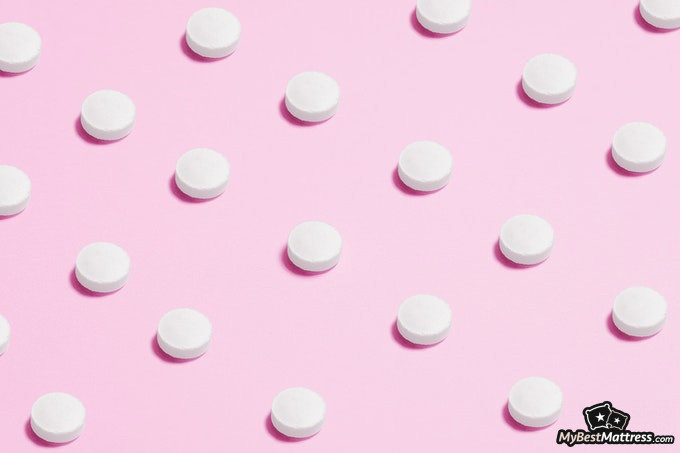
It sounds convenient — and it is — but what it actually means is that you’re using it without a doctor’s expertise. You can’t be sure how the OTC will affect your other medication used at the time, other pre-existing health factors, or allergies to certain chemical compounds.
Fortunately, the United States Food and Drug Administration (FDA) regulates both prescription and OTC medications. However, the processes are quite different.
Prescription drugs go through the procedures of analyzing all their test data, manufacturing process, and including specific information about how exactly the drug works in a person’s body. Essentially, the verifying process of OTC drugs consists of theoretical analysis of the drug’s components and their potential interactions.
In addition, OTC medications are usually used for treating something minor and short-term. For example, for a fever or a headache, you would get an OTC drug and stop using it right after the symptoms disappear.

For something more serious like gastritis, you would most likely get a prescription from your doctor and use those drugs for a prolonged period of time, even after you feel better.
Another important difference is that prescription drugs are usually significantly stronger than over-the-counter medicine. Because prescription drugs are implicitly sold after a qualified professional’s decision, they can be allowed in higher dosages without too much fear of nasty side effects.
For over-the-counter drugs, this cannot be the case, as buying simply off the shelf is not based on a professional and in-depth consultation.
Food and Drug Administration
There clearly are concerns regarding even the best over-the-counter sleep aid. However, there is an entity, which makes sure that medicine is safe and appropriate to use.
The United States Food and Drug Administration (FDA) is a federal agency, formed in 1906. Its main duty is to protect public health by ensuring the safety of human and veterinary drugs, biological products, and medical devices.
In addition to the health sector, it applies the same principles for monitoring the US’ food supply, cosmetics, and radiation-emitting products.
It regulates both prescription and non-prescription drugs, including over-the-counter sleeping pills. By law, all drugs have to be approved by the FDA before they can be marketed to the public. The drug producer has to prove that the medication is both safe and effective for the intended use.

There are some exceptions to this rule. In some cases, FDA can allow some unapproved drugs to be marketed. This happens only under special circumstances.
For example, in some cases there is not enough — or maybe even none whatsoever — of FDA-approved drug available. Yet medical professionals still tremendously need that drug to deal with serious health conditions in patients. In those cases, FDA allows some yet-unapproved alternatives to be marketed.
Best Over-the-Counter Sleep Aid
So what is the best over-the-counter sleep aid? There are quite a few contenders, actually. The most common options are either antihistamines (substances for mitigating allergy symptoms), or a synthesized version of a more natural substance.
Diphenhydramine aka Benadryl
Diphenhydramine is an antihistamine and is mainly used for allergies. Its common side effects include sleepiness and drowsiness, therefore it is often used as an over-the-counter sleeping aid.
Diphenhydramine is the main component of brand medicine Benadryl, and is often considered essentially the same drug, especially in the US markets.
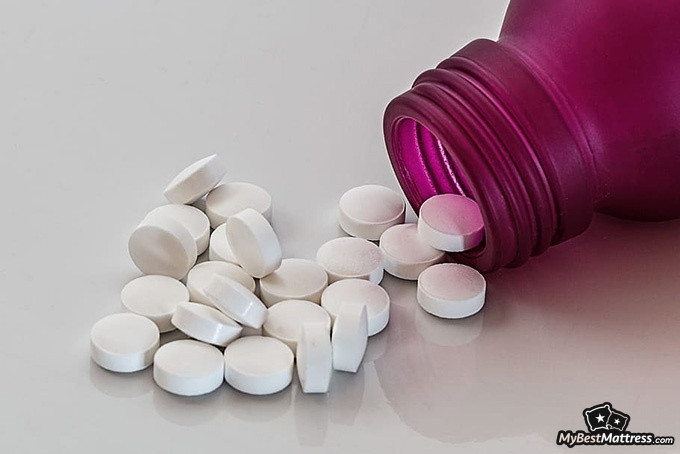
Similar to diphenhydramine, Benadryl is an anti-allergy medicine that can cause sleepiness. Therefore, it is often considered and used as one of the best over-the-counter sleeping aid. However, Benadryl’s official website does not mention this particular usage of the drug. They mention sleepiness and drowsiness only when discussing side effects.
A systematic review study reported that diphenhydramine increased the sleep duration in children by around 10 minutes[1]. Such amount of time does not seem like a big increase. On the other hand, the value of those 10 minutes in the early morning can be so precious when you want just a tiny bit more of snooze.
Latest Saatva Coupon Found:
UP TO $500 OFF
Limited-time Saatva Sale
We're sharing a limited-time Saatva mattress discount with our readers! Grab this deal & enjoy your new mattress with huge discounts.
Doxylamine
Doxylamine is another antihistamine, also used as a sleep aid. It can be used more specifically for nightly allergies as well, or to prevent morning nausea during pregnancy. Doxylamine is often used in the form of doxylamine succinate — a salt of succinic acid.
One of the most common doxylamine side effects is excessive drowsiness. Therefore you should take doxylamine (or over-the-counter sleeping pills, containing doxylamine) only before a proper night of sleep, rather than during the day.

Did you know?
Have you ever wondered which mattresses are approved as the best for sleep?
See & compare TOP mattresses side by sideMelatonin
Melatonin is a hormone that’s produced by the pineal gland in the brain. In humans, melatonin is responsible for regulating the sleep-wake cycle. Melatonin is usually released at night, and essentially the increased levels of melatonin are why we usually feel sleepy when it gets dark.
You can get melatonin as an over-the-counter drug. However, such OTC melatonin is not approved by the FDA. To be more precise, melatonin is categorized as a dietary supplement, rather than medicine.
For this reason, the FDA allows it to be marketed and sold, but melatonin does not have the same requirements as other medications. This means that restrictions that are applied to other drugs (including the best over-the-counter sleeping aid), are not applied nor monitored when it comes to melatonin.
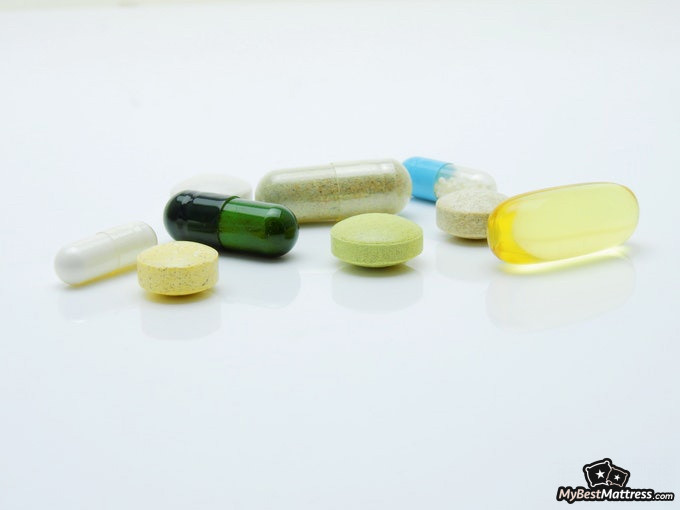
In addition to the usual side effects, it is important to remember that melatonin is a hormone. Therefore, it can have a significant impact on other medications you use, or on your natural hormone-related functions.
Research on melatonin is divided. Some scientists state[2] that melatonin improves the circadian rhythm, length and quality of sleep with fewer side effects than its alternatives. One study of Circadin — a brand drug, which uses melatonin — showed that there were no withdrawal or hangover effects even after 3 months of use[3].
Other researchers, however, claim that the effectiveness of melatonin is very limited[4] or that there is no difference when compared with a placebo study group[5].
A systematic review study in 2019 concluded that melatonin noticeably improves sleep duration in children[6] on average by half an hour. The time it took for the children in that study to fall asleep was also about half an hour.
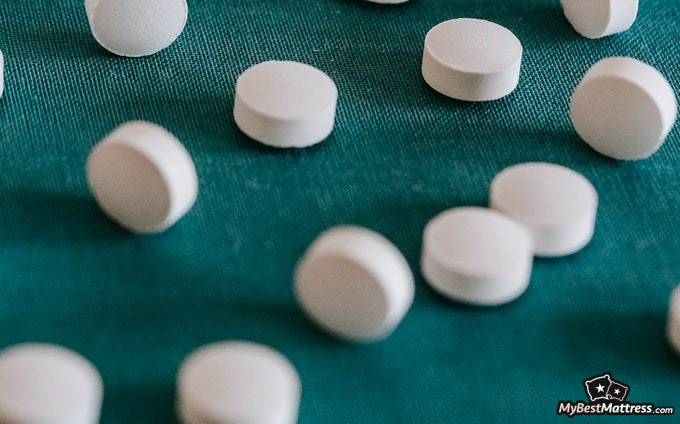
However, the study subjects randomly woke up during the night around the same number of times as they usually would. So a bit of a mixed result study, depending on which criterion is more important for you.
Compared to other described best over-the-counter sleeping aid, it may seem that melatonin is the best OTC sleep aid. However, seeing that clinical trial results and similar research are inconsistent, caution is still highly advised. As natural as melatonin sounds, it is still possible to overdose on it.
Unisom
Unisom is one of the best sleep medication brands. It offers several sleep-aid products in various forms, such as tablets, meltable tablets, capsules, gels, or even chewable gummies. Per their website, Unisom products are non-habit forming.
Unisom SleepTabs uses doxylamine succinate as their main active ingredient. Their data for the FDA approval process included a clinical study, which showed that this ingredient would help you fall asleep faster by 33%.
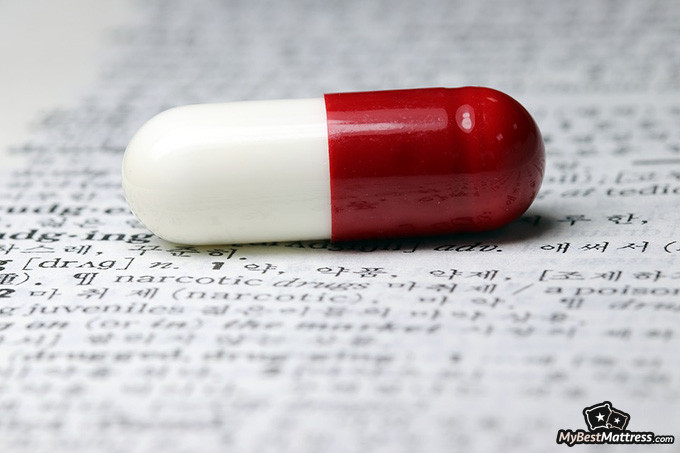
Their Unisom Simple Slumbers (the chewable gummies) use melatonin as the supplement ingredient. Melatonin works in collaboration with your own body’s natural sleep cycle, therefore such induced sleep is a bit more natural than with other ingredients.
The remaining Unisom products all use diphenhydramine hydrochloride as their main active sleep ingredient.
Magnesium
Magnesium is an important nutrient for your body. It regulates muscle and nerve functions, it’s responsible for blood sugar, also for making proteins, etc.
It significantly helps you sleep and is often perceived as potentially the best sleep medication. A clinical trial showed it helps with insomnia and to fall asleep quicker[7]. It also increases the quality of sleep itself and even mitigates that ever-so-tough chore to wake up in the morning.
The specific amount of magnesium you need depends on your age and sex, but most likely you don’t get enough magnesium through your diet. So a magnesium supplement is nothing surprising and is taken by plenty of people, especially as a pick for one of the best over-the-counter sleep aid.
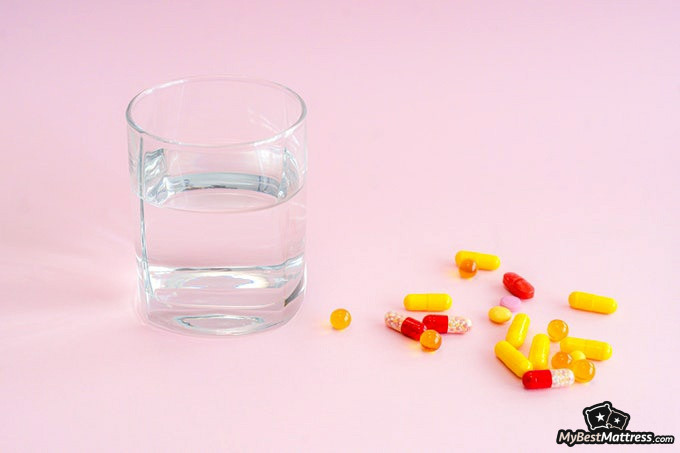
There is a wide choice of magnesium supplements on the market — both in terms of brands and chemical compositions. Therefore please make sure to consult with a doctor or the pharmacist regarding which type is best for you.
Even though magnesium is a common option for vitamin equivalent, caution is always needed. Like with some other options for the best OTC sleep aid, because magnesium is just a supplement, the FDA does not regulate it as strictly.
Because magnesium is easily absorbed, it can turn out harmful if you exceed the dosage limit. For adults, the upper limit of magnesium from dietary supplements is 350 mg per day. Too high dosages of magnesium can cause diarrhea, nausea, irregular heartbeat, or even cardiac arrest (depending on the severity of the case).
Valerian
Valerian is a flowering plant, native to Europe and Asia. It is commonly believed that the unrefined extract of valerian root has sedative properties. However, scientific research has not shown strong evidence[8] to support this claim. Nonetheless, valerian is sold as supplemental capsules to help with sleep issues or insomnia.
Valerian is classed as a dietary supplement by the FDA. Dietary supplements are regulated as foods, and not as drugs. Therefore the official regulation and monitoring of its usage are not as strict or diligent as for officially classed drugs.

What does that mean for you? It means that if there are any issues with a drug, whose main ingredient is valerian, those issues are less likely to be traced and fixed. Also, it would take considerably more time for such issue to be resolved.
Valerian should not be taken if you’re pregnant or breastfeeding. It is also highly advisable to not consume it with alcohol or sedative drugs. As with many other drugs, valerian also should not be taken by children under 3 years of age.
Some studies report valerian to have barely any side effects[9], while others found them to be more frequent when compared with other herbs[10]. Despite there being different sides regarding valerian’s safety, both sides agree that it’s not very effective.
Important Considerations
Even the best over-the-counter sleeping pills should be taken only for short-term problems. For example, to mitigate jet lag effects after a trip, or to lessen the burden of sporadic shift work changes.
However, shift work can sometimes require irregular sleeping patterns on a frequent basis. If you’re having sleep issues due to such circumstances, please consider a more long-term-oriented solution instead.
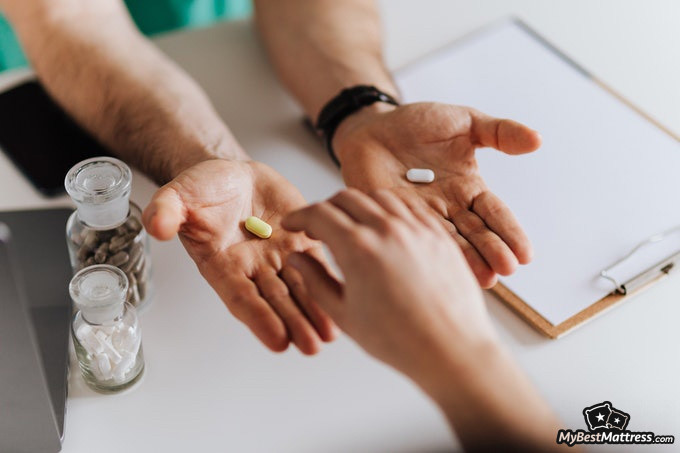
Even the best over-the-counter sleep aid cannot solve issues of chronic insomnia. In addition, if you’re using over-the-counter sleeping pills for a long period of time, prolonged exposure to artificial chemical substances can bring more health issues.
Quite a few of the best over-the-counter sleep aid drugs use antihistamines as their main ingredients. The longer you use antihistamines, the more tolerant your body becomes to them. In other words, at some point they will stop being effective.
Even though you don’t need a prescription for over-the-counter sleeping pills, it is crucial you consult with your doctor or at least the pharmacist about any potential side effects or other relevant implications.
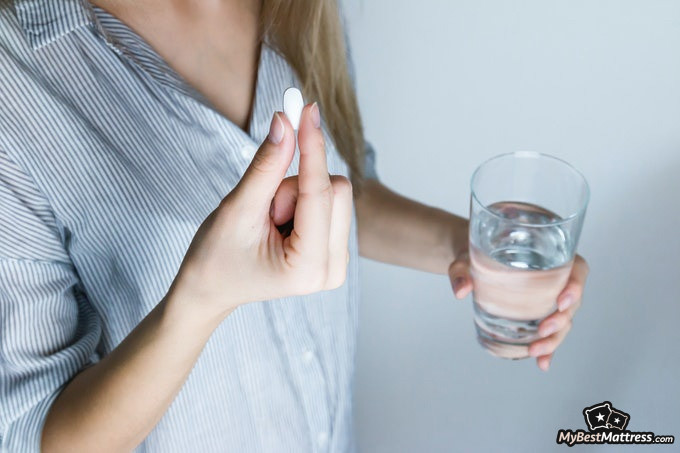
Your doctor has your full medical information and therefore can make educated and competent recommendations for which sleeping aids to use. Or the opposite — they know what can easily cause strong side effects and thus which drugs to avoid.
In addition, various medications can have different interactions based on other medications that you’re using at the same time. The same goes for health conditions you may have at the time.
Also, make sure to follow the recommended dosages. For example, an overdose of doxylamine can cause seizures[11], hallucinations[12], or even stronger complications.
Alternatives for OTC Sleep Drugs
Even the best over-the-counter sleep aid isn’t always the best choice as such. Medical supplements or drugs can easily lead to side effects, you can develop a certain level of addiction to them, it can have an unpleasant reaction to your other health circumstances, etc.
In addition, even though some of these medications are non-addictive, you can develop a psychological dependence. I would compare such drugs to coffee — once you start drinking coffee, you don’t develop an addiction as such. But, after some time, you need coffee just to stay at a neutral level of alertness.
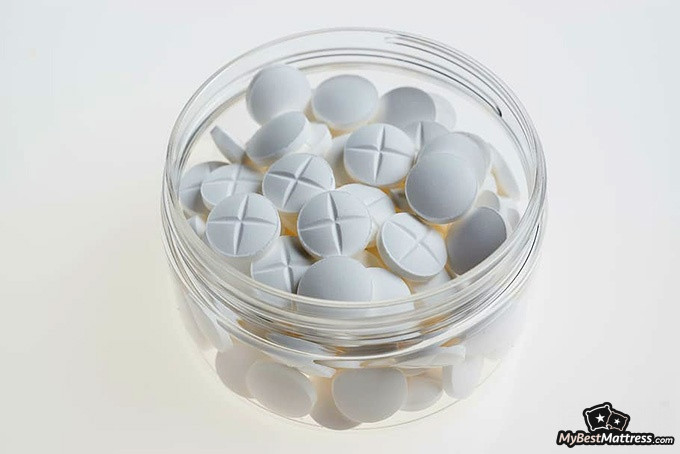
Sleeping meds are similar. You don’t necessarily have a direct dependency on them. However, at some point you can end up relying on them to fall asleep. That would mean you would have to consume sleep medication for a very prolonged time. And I’m sure you agree that does not sound healthy nor useful, don’t you?
Therefore, you should heavily consider some alternatives for even the best over-the-counter sleeping aid before you go to the pharmacy.
Sleep Schedule
Now, the most straightforward way to high-quality sleep is having enough of it. And that can be achieved by maintaining a good and healthy sleep schedule. Experts recommend at least 7 hours of sleep per night for adults.
You should also go to sleep around the same time every night. Our bodies like regularity, they like a routine. That’s because if they know when to expect certain activities, it is much easier for your internal systems to prepare and deal with relevant bodily functions during those activities.
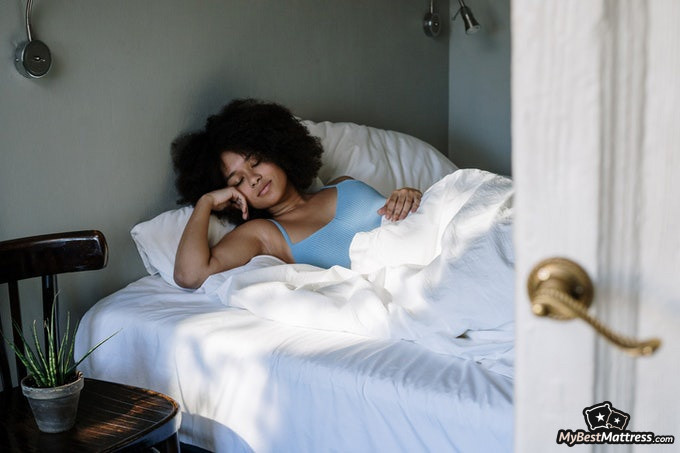
For example, if you go to sleep at the same time on a daily basis, your body knows when to prepare sleep hormones or other substances that are used during sleep. It can prepare the brain to finish up with its engine-like work and calm down.
Naturally, if you go to bed at random intervals and every day at a different time, your brain and other organs are not prepared for their resting period. Therefore, it takes them time to dwindle down and it takes you longer to actually fall asleep.
Bedtime Manners
Aside from just the sleep schedule, there are several other factors in your bedtime routine. These factors can either help or damage your sleep quality.
Get some air. You can take a walk outside to get some fresh air soon before you sleep. Definitely helps if you have a dog to walk, for example — two birds with one stone. Or you can be lazy like me and instead of going out, just open a window for about 15 minutes before bed, even if it’s a bit cold outside.
Fresh air helps you sleep because more oxygen results in higher levels of serotonin[13]. Serotonin helps you get calmer and relax, and therefore to fall asleep more easily and sleep better.
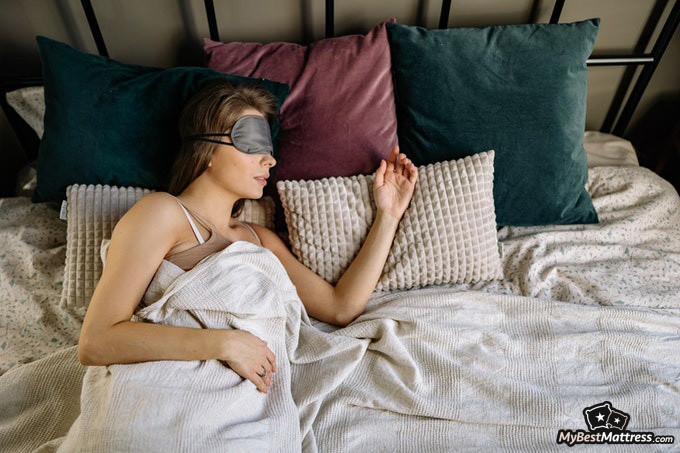
As mentioned, melatonin is usually released at night and, to be more specific, in the dark. Therefore you should turn off the lights — or at least dim them — for about 2-3 hours before you go to sleep. This will help you ease into the serene mode and for melatonin to do its work.
In addition to the overall room light, you should also avoid screen devices before bed. This is probably the toughest “requirement” of them all, considering how addicted we are to our phones or computers or TV screens. So I definitely understand if you don’t want to adhere to this advice.
But it is highly recommended to not stare into an LED screen for about 2-3 hours before bed. That type of screen emits blue light, which blocks the production of melatonin, and makes it more complicated for you to fall asleep.
Bedroom Setup
You could have the best bedroom manners, and a pretty decent sleep schedule, but let me tell you from experience — it means very little if you don’t have a proper bed. Or to be more precise, a high-quality mattress.
There are two main reasons why I struggle to fall asleep or sleep well. Those are that I either simply feel uncomfortable, or the bedding just feels too hot and stuffy.
Saatva mattresses solve both of these issues. Because Saatva products are made from a mixture of springs and foam, it manages to have good ventilation and therefore doesn’t become too warm when you sleep on them.
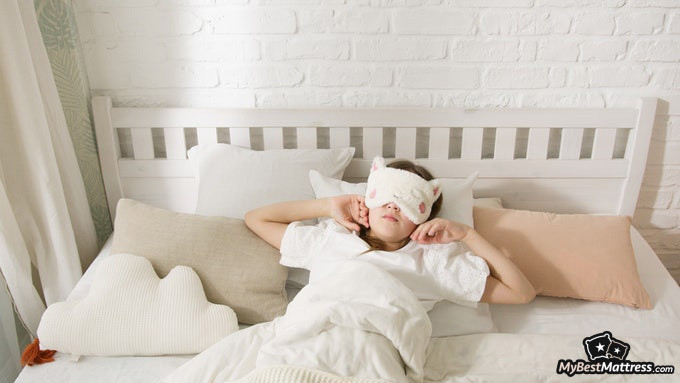
They also are highly suitable for any type of sleeper. To explain, Saatva beds are great despite your sleeping position. Whether you sleep on your side, stomach, or back — Saatva will feel comfortable.
Currently, Saatva prices start at only $887, and you can find discount coupons!
One of the crucial factors for your sleep can be motion isolation. If you’re sharing your bed (with a partner, a pet, or a child), and they tend to toss and turn, a poor mattress would make you feel their every movement. And you can’t calmly sleep yourself, when there’s all that disturbing movement going on, now can you?
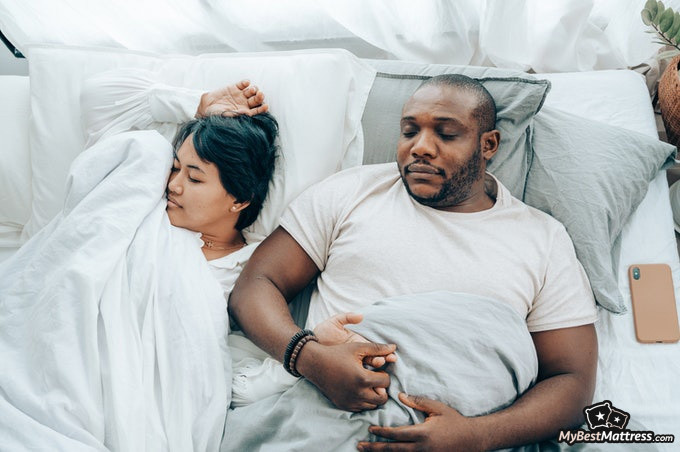
Currently, the best mattresses in the market with high motion isolation are by Puffy. With several layers of foam, Puffy beds will absorb your bed partner’s movements and you shouldn't feel a thing. That way you’ll be able to both fall asleep and sleep without distractions.
Depending on the size, Puffy products start at a mere $599, and there are discounts available!
If price is of high importance to you and if you want to get the most out of the least, Layla may be the brand for you. Depending on the model, its price starts as low as $599.
It’s also a flippable mattress with one softer and one firmer side. So essentially you’re getting two different sleeping options for the price of one! And with additional discount deals, that price would be even lower.
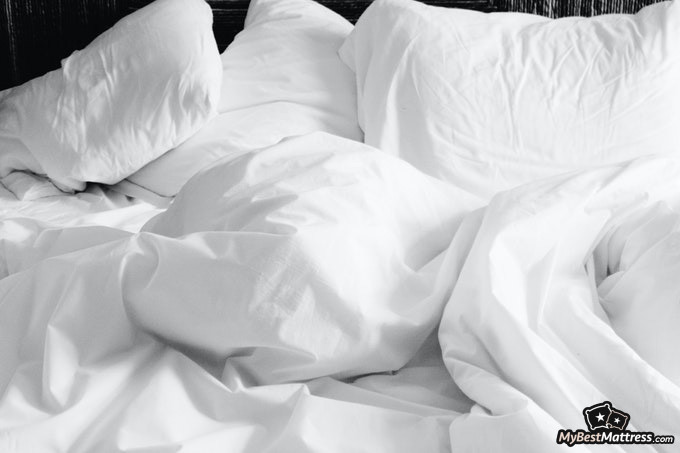
In addition, a very important aspect of your bedding is the pillow. It can cause or prevent neck pains, or it could easily flare up your allergies due to dust mites.
Now try to imagine if you spent about half a day worried about how your body feels due to the poor sleep you had the night before. Both the mattress and the pillow have a tremendous effect on your physical and mental wellbeing on a daily basis.
Best Natural Substitutes for OTC Drugs
The most common substances in sleep aids are diphenhydramine, doxylamine, melatonin, and valerian. Magnesium is used as a separate sleep aid as well. Diphenhydramine and doxylamine are chemical compounds and therefore are not available naturally.
However, melatonin, magnesium, and valerian can be found in more natural forms.
Melatonin can be obtained from several foods. Tart cherries, plums, grapes, rice, cereals, some herbs, olive oil. It can even be found in wine and beer. To be perfectly honest though, I’m really not sure if you should indulge in either wine or beer if you want to have a restful night afterward, with melatonin or without.
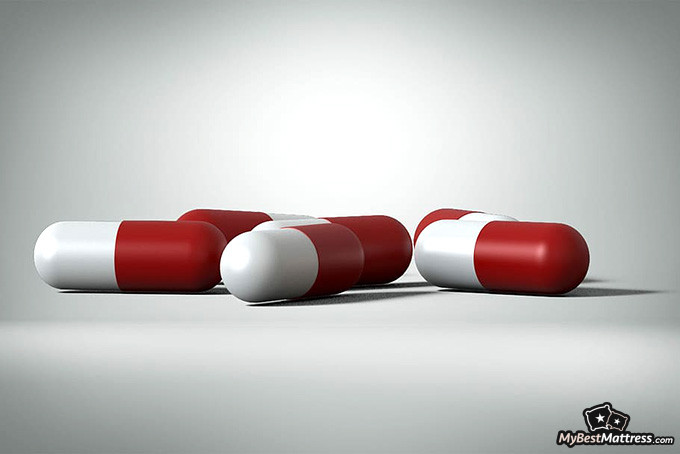
Magnesium can be found in various food products. If you adjust your habits to include more leafy greens, whole grains, nuts, seeds, and legume products, you will be helping yourself with the magnesium levels. In addition, fortified foods, milk or some milk products (including yogurt) are rich in magnesium as well.
Valerian is a naturally-occurring plant. You could actually grow it in your garden or even your bedroom! And if you have a cat, I’m sure this will be highly approved. It’s a low-height plant (up to 6 inches), but it can grow up to 18 inches in width, so make sure you have enough space or are prepared to regularly trim it.
If you’re not a fan of plants, you could simply have a cup of valerian tea before sleep. There are records dating back to the 16th century, showing a prescription of valerian tea for a sick woman. So this remedy has been around for a really long time.
Herbal Teas for Sleep
Valerian isn’t the only herbal tea that may help you fall asleep. Chamomile is probably considered the queen of calming teas. Its soothing qualities are definitely useful to calm yourself down before sleep and enter the dream world more easily. In addition to popular belief, it has been backed up by research[14].
Another staple choice for soothing tea is lavender. Effective both in aromatherapy and in tea form, lavender tea lessens your fatigue and distress[15].
Lemon balm is full of melatonin and therefore lemon balm tea is a great option for your sleep. Its bioactive compounds serve the role of antioxidants[16] and thus are good not just for your sleep, but for you overall.

Actually, you can grow all of them — valerian, chamomile, lavender, and lemon balm — as houseplants or even have them in your bedroom.
As contradictory as it sounds, in order to calm down, you might want some passion. Or rather, the passionflower. Passiflora incarnata is a popular herbal remedy for the struggles of falling asleep. Scientific tests confirm that passionflower tea is quite an effective choice for your sleep[17].
The mentioned researches showed great results, but also mostly only short-term ones. Therefore, in the long term, you should look for another approach to calm down and reach tranquili-tea.
Aromatherapy
If you’re not a fan of drinking herbal teas before bed, what about simply smelling them? A study in 2016 showed that aromatherapy treatments are effective for your sleep quality[18]. Aromatherapy also reduces levels of anxiety, stress[19], even depression.
Aromatherapy is cheap, easy to set up, non-invasive, and non-disturbing way to calm down and be soothed into sleep.
Conclusions
If you have trouble sleeping, you may want to try over-the-counter sleeping pills. The best over-the-counter sleep aid that I’ve covered in this article are diphenhydramine (often sold as Benadryl), doxylamine, melatonin, and magnesium.
I do also heavily recommend trying more natural ways to improve your sleep first. The easiest and most effective way for a great night's sleep is having a high-quality mattress. For temperature control you will want Saatva, for motion isolation — Puffy, and for price-quality balance you will love Layla.
Even the best OTC sleep aid can have its drawbacks. Please don’t forget to consult with your doctor or pharmacist before taking even the best over-the-counter sleeping aid to make sure that’s the ultimate choice for you. When you decide what’s best — sleep medication or not, I hope you'll sleep well!
Scientific References
1. Marian S McDonagh, Rebecca Holmes, Frances Hsu: 'Pharmacologic Treatments for Sleep Disorders in Children: A Systematic Review'
2. Zizhen Xie, Fei Chen, William A Li, et al.: 'A review of sleep disorders and melatonin'
3. M-A Quera-Salva, B Claustrat: '[Melatonin: Physiological and pharmacological aspects related to sleep: The interest of a prolonged-release formulation (Circadin ®) in insomnia]'
4. S Huysmans, M De Hert, F Desplenter: '[Melatonin and sleep disorders: Overview of literature and testing in psychiatric practice]'
5. Mackenzie Pierce, Sunny A Linnebur, Scott M Pearson, et al.: 'Optimal Melatonin Dose in Older Adults: A Clinical Review of the Literature'
6. Marian S McDonagh, Rebecca Holmes, Frances Hsu: 'Pharmacologic Treatments for Sleep Disorders in Children: A Systematic Review'
7. Behnood Abbasi, Masud Kimiagar, Khosro Sadeghniiat, et al.: 'The effect of magnesium supplementation on primary insomnia in elderly: A double-blind placebo-controlled clinical trial'
8. Stephen Bent, Amy Padule, Dan Moore, et al.: 'Valerian for sleep: a systematic review and meta-analysis'
9. Diana M Taibi, Carol A Landis, Heidi Petry, et al.: 'A systematic review of valerian as a sleep aid: safe but not effective'
10. Matthew J Leach, Amy T Page: 'Herbal medicine for insomnia: A systematic review and meta-analysis'
11. Husnain Syed, Sumit Som, Nazia Khan, et al.: 'Doxylamine toxicity: seizure, rhabdomyolysis and false positive urine drug screen for methadone'
12. Okşan Derinöz-Güleryüz: 'Doxylamine succinate overdose: Slurred speech and visual hallucination'
13. M Nishikawa, Y Kumakura, S N Young, et al.: 'Increasing blood oxygen increases an index of 5-HT synthesis in human brain as measured using alpha-[(11)C]methyl-L-tryptophan and positron emission tomography'
14. Shao-Min Chang, Chung-Hey Chen: 'Effects of an intervention with drinking chamomile tea on sleep quality and depression in sleep disturbed postnatal women: a randomized controlled trial'
15. Shu-Lan Chen, Chung-Hey Chen: 'Effects of Lavender Tea on Fatigue, Depression, and Maternal-Infant Attachment in Sleep-Disturbed Postnatal Women'
16. Teresa Herrera, Yolanda Aguilera, Miguel Rebollo-Hernanz, et al.: 'Teas and herbal infusions as sources of melatonin and other bioactive non-nutrient components'
17. A Ngan, R Conduit: 'A double-blind, placebo-controlled investigation of the effects of Passiflora incarnata (passionflower) herbal tea on subjective sleep quality'
18. Eunhee Hwang, Sujin Shin: 'The effects of aromatherapy on sleep improvement: a systematic literature review and meta-analysis'
19. Ezgi Karadag, Sevgin Samancioglu, Dilek Ozden, et al.: 'Effects of aromatherapy on sleep quality and anxiety of patients'
Leave your honest feedback
Leave your genuine opinion & help thousands of people to choose the best mattress. All feedback, either positive or negative, are accepted as long as they’re honest. We do not publish biased feedback or spam. So if you want to share your experience, opinion or give advice - the scene is yours!



